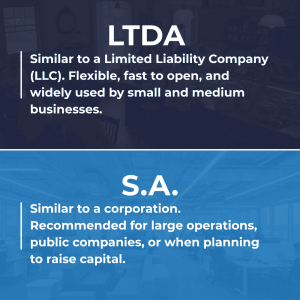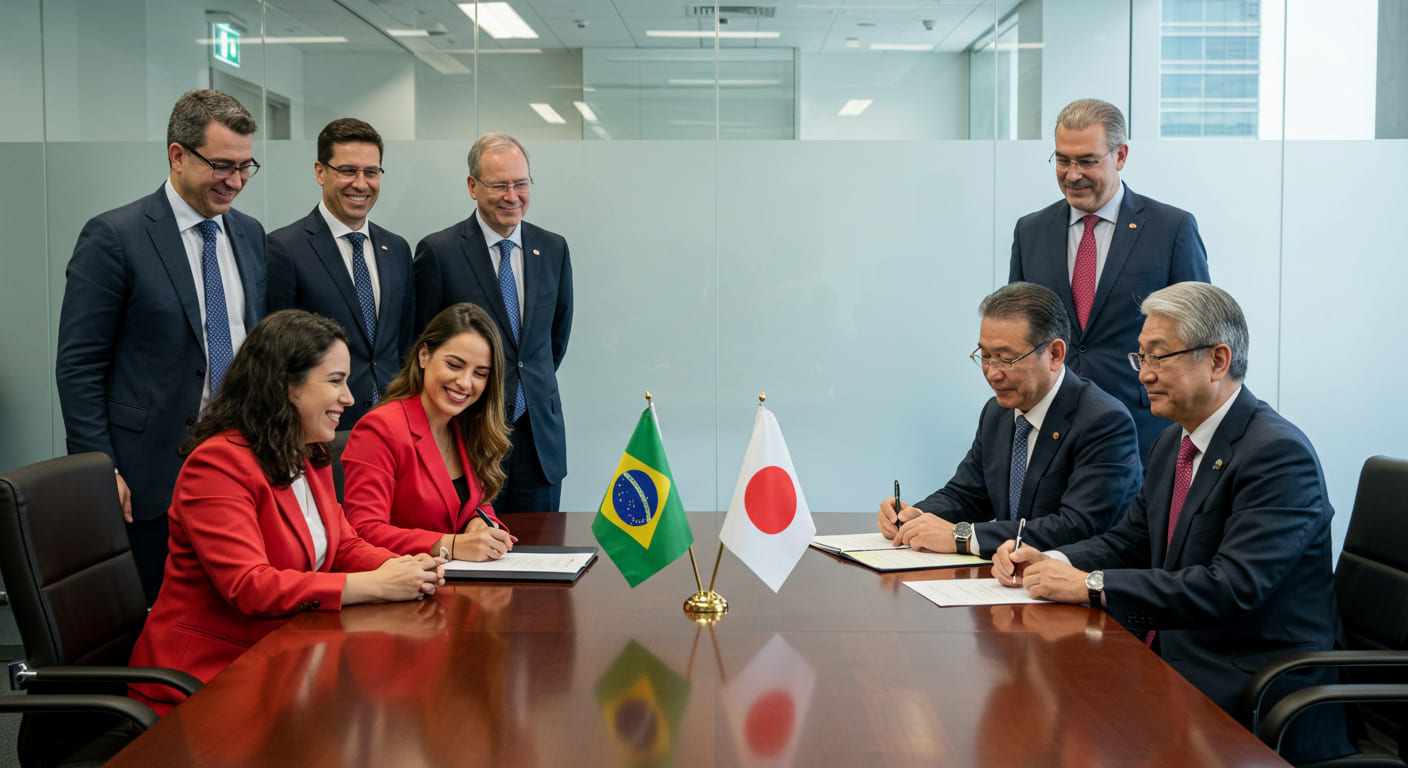Why Invest in Brazil
Brazil is not just the largest economy in Latin America — it is a strategic gateway to a market of over 210 million people and a hub for South American trade.
For foreign entrepreneurs, Brazil offers a diverse range of opportunities in industries such as technology, agribusiness, manufacturing, energy, finance, and logistics.
The country’s growing middle class, strong consumer market, and access to Mercosur make it especially attractive for companies looking to expand operations. In recent years, Brazil has also made efforts to simplify business registration and digitalize tax processes, offering a more transparent environment for investors.
However, while the potential is immense, the process of opening a company in Brazil involves navigating a bureaucratic system with specific legal, tax, and administrative steps. Understanding this framework is key to success.
Understanding the Legal Framework

Foreign investors can legally establish companies in Brazil, but the process follows a specific legal framework
that ensures transparency and compliance with national tax and corporate laws.
These formalities are not just bureaucracy — they’re essential to guarantee that the business is properly recognized by
the authorities, that foreign capital is lawfully registered, and that future profit transfers or expansions happen without legal obstacles.
By understanding these rules from the start, investors can avoid delays,
reduce risks, and build a solid foundation for long-term operations in Brazil.
Key Legal Requirements
CPF (Cadastro de Pessoa Física)
Every foreign individual involved in a Brazilian company — as partner, shareholder, or administrator — must obtain a CPF, the national taxpayer ID number.
Tip: The CPF can be issued through Brazilian embassies, consulates, or directly via Receita Federal’s website.
CNPJ (Cadastro Nacional da Pessoa Jurídica)
Once the company is created, it must have a CNPJ — the corporate tax ID used for all official transactions, invoices, and tax payments.
Legal Representative
Foreign partners are required to appoint a Brazilian resident to represent them in all legal and tax matters.
This representative acts as the company’s official contact before the government.
Central Bank Registration (Bacen)
Every investment from abroad must be registered electronically with the Central Bank of Brazil.
This guarantees that future profit repatriations, capital increases, or foreign transfers are authorized and traceable.
Choosing the Right Company Type

Foreign investors typically choose between two main corporate structures:
1. Sociedade Limitada (LTDA)
This is the Brazilian equivalent of a Limited Liability Company (LLC). It’s the most common type for small and medium-sized businesses due to its flexible management structure and simpler incorporation process.
2. Sociedade Anônima (S.A.)
Similar to a corporation, the S.A. structure is ideal for larger businesses planning to raise capital or operate publicly. It offers stronger corporate governance and is mandatory for listed companies.
Key Differences
| Feature | LTDA | S.A. |
|---|---|---|
| Minimum Shareholders | 2 | 2 |
| Management | Direct (quotaholders) | Board of Directors + Officers |
| Public Trading | Not allowed | Allowed |
| Regulatory Complexity | Low | High |
| Best for | SMEs, service providers | Large corporations, investors |
Choosing the right structure impacts taxation, investor protection, and future scalability — making it a decision that should always be guided by specialized legal and accounting advice.
Step-by-Step Process to Open a Company

Step 1: Obtain a CPF
Foreign partners must first apply for a CPF. This can be done through Brazilian embassies, consulates, or directly via the Receita Federal’s online system.
Step 2: Draft the Articles of Association (Contrato Social)
A lawyer or accountant in Brazil prepares the Articles of Association, defining the company’s name, address, purpose, share capital, and administrative powers.
Step 3: Register with the Board of Trade (Junta Comercial)
Once approved, the company is officially incorporated at the state’s Board of Trade. This registration is the legal birth of the company.
Step 4: Obtain the CNPJ
The Federal Revenue Service issues the CNPJ after the company’s registration is validated. This number is necessary for all fiscal operations.
Step 5: Register the Investment at Bacen
All foreign investments must be registered electronically with the Central Bank. This ensures that the inflow of funds is traceable and that the investor can repatriate profits legally.
Step 6: Apply for Municipal and State Licenses
Depending on the business activity, you may need operating permits such as health, environmental, or commercial licenses.
Each municipality and state has its own requirements.
Step 7: Open a Corporate Bank Account
Banks in Brazil conduct strict “Know Your Customer” (KYC) checks.
The legal representative usually needs to be present at the branch, and most banks will request the company’s CNPJ, Articles of Association, and proof of registration.
Understanding Taxation in Brazil

Brazil’s tax system is known for its complexity — but with proper planning, foreign investors can operate efficiently and profitably.
Main Taxes on Companies
-
IRPJ (Corporate Income Tax): 15% on taxable income, plus a 10% surtax on profits exceeding BRL 20,000 per month.
-
CSLL (Social Contribution on Net Profit): 9% on profits.
-
PIS/COFINS: Federal contributions similar to VAT, levied on gross revenue.
-
ISS/ICMS: Municipal and state taxes depending on whether the company sells goods or services.
Tax Regimes
1. Lucro Real (Actual Profit): Mandatory for large companies and those in financial or regulated sectors. Based on actual accounting profit.
2. Lucro Presumido (Presumed Profit): Simplified method where tax is calculated on an estimated profit margin. Often more advantageous for services and SMEs.
3. Simples Nacional: Unified tax system for small businesses with limited revenue — not typically available for companies with foreign shareholders.
Upcoming Tax Reform (2026 and Beyond)
Brazil is transitioning to a dual VAT system under the new IBS (Imposto sobre Bens e Serviços) and CBS (Contribuição sobre Bens e Serviços).
This reform aims to simplify the tax structure and unify indirect taxes, reducing cascading effects and bureaucracy.
Foreign companies should prepare to adapt their systems and pricing models before 2026.
Investor Visa and Immigration Options

Foreign investors who wish to live and manage their businesses in Brazil can apply for an Investor Visa (Visto de Investidor).
Minimum Investment: BRL 500,000 for general businesses or BRL 150,000 for innovation/startup projects.
Duration: Initially granted for two years, renewable, and may lead to permanent residency.
Rights: The visa holder can legally reside in Brazil and act as the company’s administrator.
Alternative: Investors may remain abroad and appoint a local representative if they don’t wish to relocate.
Visa rules are periodically updated, so consultation with a qualified legal and immigration advisor is essential before starting the process.
Timeline, Costs, and Practical Considerations

Timeline: The full incorporation process usually takes between 3 and 6 weeks, depending on state bureaucracy, licensing, and banking procedures.
Costs: Legal, accounting, and government fees vary widely by location and business activity.
Banking: Expect to provide notarized translations of foreign documents.
Language: All corporate documentation must be in Portuguese — certified translations are mandatory.
Pro tip: having a bilingual accounting partner can save weeks in communication and document processing.
Common Mistakes to Avoid

1. Skipping Bacen registration: This prevents profit repatriation and may cause compliance issues.
2. Choosing the wrong tax regime: A small miscalculation can lead to excessive taxation.
3. Not appointing a trustworthy representative: This person manages all legal and financial responsibilities on your behalf.
4. Ignoring local compliance rules: Payroll, tax filings, and bookkeeping must comply with Brazilian standards.
5. Trying to operate remotely without local guidance: Bureaucracy in Brazil often requires on-site validation.
Why Work with a Brazilian Accounting Partner

Opening a company in Brazil without specialized guidance can quickly become a challenge. The country’s tax system, labor laws, and reporting requirements are complex, and even minor errors can lead to significant penalties or delays.
That’s why partnering with a local accounting and consulting firm is not just a convenience — it’s a strategic decision.
A Brazilian accounting partner acts as your bridge to local compliance. They manage everything from tax filings, payroll, and bookkeeping to the registration of foreign capital with the Central Bank. They also interpret new tax reforms, monitor legislative updates, and help your company stay fully compliant while minimizing unnecessary costs.
Beyond compliance, a good partner provides strategic financial insight. They analyze your company’s operations, identify tax optimization opportunities, and guide you in choosing the most efficient structure — whether through Lucro Real, Lucro Presumido, or Simples Nacional (when eligible).
Having local expertise means you can focus on running your business while professionals handle the regulatory side with precision and transparency.
In short, a reliable Brazilian accounting firm doesn’t just file your taxes — it becomes an extension of your business, ensuring that your operations in Brazil remain profitable, lawful, and sustainable.
CLM Controller: Your Strategic Partner in Brazil
With over 40 years of experience and a team of 120+ professionals, CLM Controller specializes in helping foreign companies establish and grow in Brazil.
Our services include:
-
Accounting, tax, and payroll outsourcing (BPO).
-
Legal representation and Central Bank registration.
-
Corporate and tax consulting for foreign investors.
-
Full support for financial reporting, compliance, and business planning.
We operate as an outsourced accounting partner, ensuring that your company meets all legal and fiscal obligations while optimizing costs and profitability.
Conclusion

Brazil represents one of the most dynamic and promising markets in the world — but also one of the most complex in regulatory terms.
By understanding local requirements, choosing the right business structure, and partnering with an expert accounting firm, foreign entrepreneurs can turn this challenge into a strategic opportunity.
If you’re ready to expand your business into Brazil, CLM Controller is here to guide you through every step — from incorporation to daily financial management.
Learn more at www.clmcontroller.com.br
Contact us today and start your journey toward successful investment in Brazil.






0 Comments